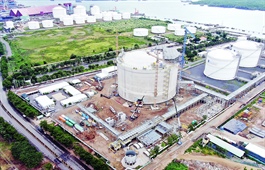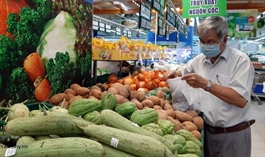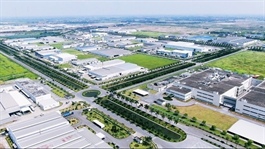Australian programme helps Vietnamese farmers overcome pandemic
Australian programme helps Vietnamese farmers overcome pandemic
The Gender Responsive Equitable Agriculture and Tourism (GREAT) Programme is an AU$33.7 million (US$22.5 million) Australian Government funded initiative that promotes gender equality and women’s economic empowerment, with a focus on the ethnically diverse provinces of Son La and Lao Cai in Viet Nam’s north-west.
The programme has spared no efforts in helping local enterprises overcome the obstacles caused by the pandemic to maintain operations.
Le Huong chats with Phil Harman, the programme’s team leader, on the efforts.
Could you briefly outline the mission of GREAT?
We work with the private sector, government agencies and NGOs to create opportunities for women within the agriculture and tourism sectors.
These sectors have demonstrated strong economic growth and have the potential to increase the economic participation of ethnic minority women. So far, we have been supporting 57 projects in agriculture and tourism.
Since the outbreak of the pandemic in Viet Nam, what have you done to support the involving enterprises in agriculture and tourism?
COVID-19 has had a significant negative impact on tourism and agricultural value chains such as vegetables and medicinal plants. GREAT has responded with a COVID-19 Response and Recovery plan that is supporting businesses to rebound and help build the resilience of ethnic minority women to future shocks.
This has included strengthening the management capacity of enterprises in different sectors, such as bamboo shoots, medicinal plants and tourism and enabling them to pivot to new markets, reduce operational costs and diversify products.
For example, GREAT has supported Son Thuy Agro-Forestry Cooperative in Van Ban, Lao Cai, to develop a business strategy and upgrade processing such as introducing a solar drying house and fermentation technology to create new bamboo shoot products. This is bringing in higher added value for the products by targeting high-end markets.
When it was possible, we organised meetings among tourism households to discuss the pandemic’s impacts on the market, to identify solutions that reduce the impact, and find alternative markets for community-based tourism services and products.
Subsequently, GREAT has facilitated access to finance to upgrade homestays to meet the needs of the domestic market for destinations that traditionally relied on international visitors, as well as training to ensure businesses are “COVID-safe”. Funding was provided to our tourism partners to equip them with thermometers and hand sanitiser to help keep their guests, families and local community safe.
COVID-19 has also highlighted the digital divide between urban and rural areas and with ethnic minority communities. GREAT has provided training and mentoring to women-led businesses to utilise digital technology to improve productivity and develop new markets through e-commerce platforms and via social media.
GREAT has also introduced a mobile app for agriculture business supply chains, including ramie, vegetables and medicinal plants. This includes a training module to enable larger numbers of ethnic minority women to learn and apply new production skills, and overcome the challenges caused by travel restrictions due to COVID-19. Online training on how to use the app has also been provided to enable more women to attend during their free time. The app also integrates ethnic minority languages to overcome literacy issues.
What are the results so far?
GREAT has provided business development support and e-commerce training to almost 100 enterprises, including enterprises who have no or limited online experiences. For enterprises receiving digital business model training and mentoring, there has been a high uptake in adopting digital tools for daily business activities to both improve how the business runs and to reach new customers.
So far, 80 per cent of enterprises have sold their products on e-commerce platforms (Voso, Sendo). The remaining 20 per cent are now more familiar with online platforms and can use social media to market their products. There have been positive results in the increased online revenue of participating businesses.
For example, after a ten-week online training programme, the total online revenue of participating enterprises reached more than VND 800 million (7 partners), an increase of two to three times (before the training, the figure was about VND 300 million on average for 10 weeks).
The most successful enterprises include Ha Khuyen Homestay in Son La and Hao Anh Agriculture Co-operative in Lao Cai.
In the first case, the owner started, with zero prior knowledge of online marketing while just concentrating on tourism services. After ten weeks, the enterprise had revenue of VND55 million (US$2,466) from selling oranges and bamboo shoots online and hosting guests.
In the second case, the enterprise made VND433 million in 2.5 months through promoting online sales. The cooperative sells various types of rice and wine.
In the tourism sector, with our support and facilitation, local enterprises have introduced new tourism products aiming at domestic tourists like short trekking routes; cultural display spaces/houses; herbal foods; flower gardens and farm experiences.
Homestays have been upgraded to reach the high quality standards needed to appeal to the domestic visitors, as well as being eco-friendly.
We have connected homestays in the two provinces with tour operators, who have a significant domestic market. For example, some 20 tour operators have formed a business alliance and launched a product targeting the domestic market. More than 1,000 tour packages for community-based tourism destinations in Moc Chau had been sold before the more recent lockdowns.
Do you have any further plans to support enterprises to get sustainable development despite the pandemic?
As many enterprises are still struggling and market conditions are uncertain, GREAT will continue to work with enterprises and the government to support recovery efforts. This includes working with banks and financial institutions to improve access to finance, launching a destination marketing campaign to attract visitors back to the beautiful destinations across Lao Cai and Son La and improving crisis management planning.
We will also further enhance locals’ online marketing skills for the “new normal” period.



















